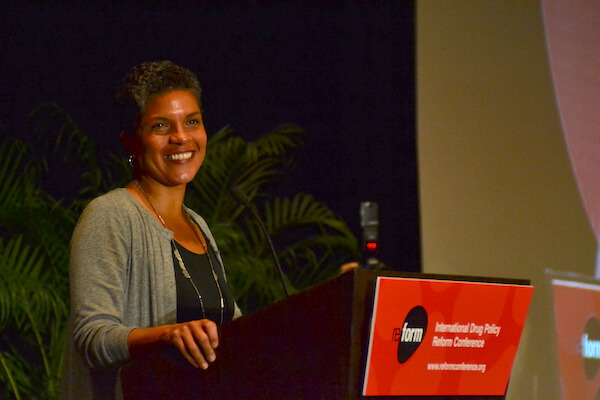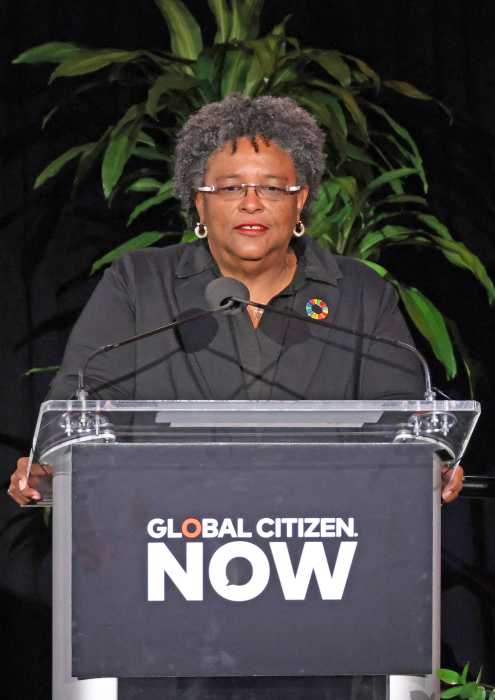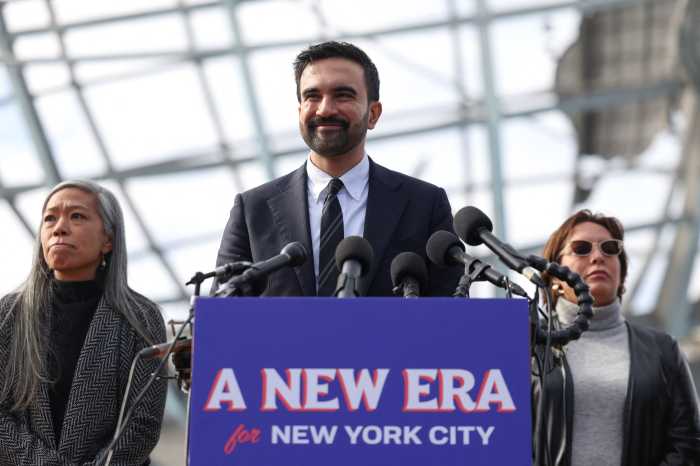Michelle Alexander delivering the plenary address in Atlanta. | DOUG McVAY/ INTERNATIONAL DRUG POLICY REFORM CONFERENCE
Activists from across the globe gathered in Atlanta October 11-14 to plot strategy for defanging drug prohibition in the United States. The conference, called by the Drug Policy Alliance, scrambled to balance recognition of the limited possibility for gains and the conviction that justice demands sweeping reforms.
Michelle Alexander, whose 2010 book “The New Jim Crow” laid out in damning detail the harsh penalties imposed on black and brown communities under the guise of fighting drugs, gave the plenary address, which took on the puzzle of President Donald Trump’s election.
In a fierce display of racial solidarity, she said, voters in 30 states supported Trump’s “deliberate appeal to white racial resentment and anxieties” while at the same time voters legalized pot in four states and led four more states to enable medical marijuana programs. A greater turnout by black and brown voters would have defeated Trump in states like Florida, North Carolina, and Pennsylvania.
PERSPECTIVE: The Long View
The results don’t represent a paradox, insisted Alexander, but fit the longstanding pattern of Jim Crow justice. Last year, 64,000 Americans died from drug overdoses, she said in a fiery speech, a number greater than the total of all the soldiers killed in Vietnam.
“Yes there is an outcry, but it is relatively muted compared to the crack epidemic,” she said.
Crack “killed just a tiny fraction of those dying of opioid overdoses and yet a literal war was declared on poor people of color — a militaristic war” during the height of crack use, she argued. There were “round-ups of people herded into courtrooms.
“Things are very different this time around. The white face of medical marijuana and the white male face of drug heroes such as those in ‘Breaking Bad’ make it possible for white folk to feel a kind of empathy that was utterly impossible 20 years ago in the midst of the crack epidemic.”
Alexander warned that the contrast between white people’s ability to sympathize with Caucasian users and their indifference to the suffering in black and brown communities is more than a weakness in drug policy. As Trump’s election demonstrates, she said, that disparity in attitudes threatens democratic government.
A racially mixed crowd of 1,500 gathered in Atlanta as Alexander insisted that whites must break out of the cocoon that shields them from appreciating the suffering of other communities.
Citing sentencing reformer Marc Mauer’s book, “Race to Incarcerate,” she explained, “The most punitive nations in the world are the most diverse; the nations with the most compassionate, or the most lenient criminal justice policies, are the most homogenous. You know, we like to say that diversity is our strength when it may actually be our Achilles heel.” Jim Crow justice, Alexander said, threatens civil liberties in the US and it fosters a failed government that could undermine “the future of the globe.”
The argument that whites must check their privilege and make common cause with immigrants, blacks, Latinos, and Native Americans was a constant conference theme. A true interracial majority coalition is a key objective of the Drug Policy Alliance.
There are hopeful signs. Harm reduction programs are spreading in the South, and in California a new law reduced mandatory sentences, with Governor Jerry Brown signing the RISE Act just as the conference convened. The measure ends sentencing enhancements that have added three years to drug convictions for every prior conviction. Long sentences are cruel and cause the pernicious pattern of mass incarceration.
Other good news: in Atlanta, the mayor signed a bill decriminalizing marijuana possession, and there are rumors that communities across New York State are prepared to move toward experimental safe consumption spaces where drug users are in the presence of an overdose prevention worker who can intervene immediately if things go wrong.
This conference was the first hosted by Maria McFarland Sánchez-Moreno, who has replaced Ethan Nadelmann as the Drug Policy Alliance’s executive director. McFarland Sánchez-Moreno has done human right work in drug war battlefields in Peru and Columbia, and during her tenure as co-director of US Programs at Human Rights Watch, her team pushed against racial discrimination in policing, excessive sentencing, and unfair deportation policies that tear families apart.
The Drug Policy Alliance first championed medical marijuana as a first step in unwinding prohibition, but the organization’s program has expanded and now calls for decriminalization of all drugs. Essentially, the group wants the police to arrest no one for drug possession, but instead steer a drug user to a harm reduction program. This is the policy in Portugal and is being tested in Seattle.
The unhappy truth, however, is that this approach would have only a tangential impact on harsh Jim Crow justice.
Possession seldom brings long sentences; these sentences are imposed on sellers. The opioid crisis has brought a new wave of arbitrary penalties. Sellers are seen as murderers because their product includes fentanyl. Yet they don’t make the product, and in the northeast US virtually 100 percent of the street product is fentanyl or laced with it.
Dealers have no control over the ingredients, but they are sentenced as though they created the system.
A sweeping opposition to the criminalization of poverty and drug use forms the radical core of the Drug Policy Alliance, and Atlanta made that ultimate objective abundantly clear.


















